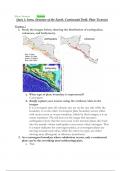Exam (elaborations)
University of Ottawa: GEO 1111 Quizzes 1-4 Answered Latest Fall 2024/2025.
- Course
- GEO 1111 (GEO1111)
- Institution
- University Of Ottawa (U Of O )
Short Answer Answer Quiz 1: Intro, Structure of the Earth, Continental Drift, Plate Tectonics Version 1 1. Study the images below, showing the distribution of earthquakes, volcanoes, and bathymetry. a. What type of plate boundary is represented? Convergent b. Briefly explain your answer usin...
[Show more]



